(word完整版)虚拟语气表格归纳,推荐文档
- 格式:doc
- 大小:60.01 KB
- 文档页数:4
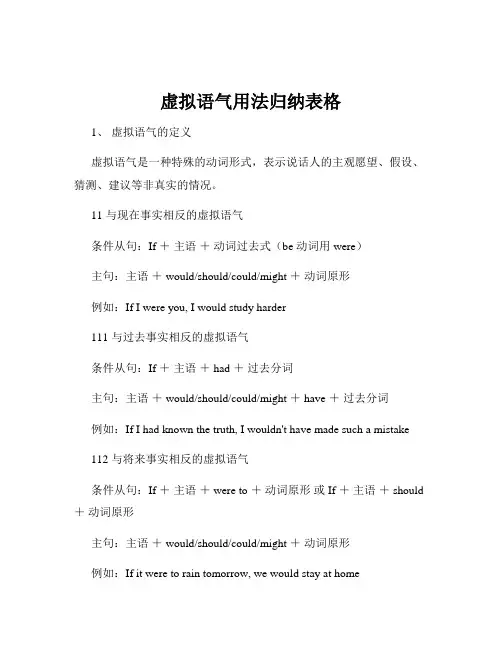
虚拟语气用法归纳表格1、虚拟语气的定义虚拟语气是一种特殊的动词形式,表示说话人的主观愿望、假设、猜测、建议等非真实的情况。
11 与现在事实相反的虚拟语气条件从句:If +主语+动词过去式(be 动词用 were)主句:主语+ would/should/could/might +动词原形例如:If I were you, I would study harder111 与过去事实相反的虚拟语气条件从句:If +主语+ had +过去分词主句:主语+ would/should/could/might + have +过去分词例如:If I had known the truth, I wouldn't have made such a mistake 112 与将来事实相反的虚拟语气条件从句:If +主语+ were to +动词原形或 If +主语+ should +动词原形主句:主语+ would/should/could/might +动词原形例如:If it were to rain tomorrow, we would stay at home121 wish 后的宾语从句与现在事实相反:从句用一般过去时与过去事实相反:从句用过去完成时与将来事实相反:从句用 would/could +动词原形例如:I wish I were a bird (与现在事实相反)122 would rather 后的宾语从句与现在或将来事实相反:从句用一般过去时与过去事实相反:从句用过去完成时例如:I would rather you came tomorrow (与将来事实相反)13 虚拟语气在主语从句中的应用It is +形容词+ that 句型中,形容词为 necessary, important, strange 等时,从句用“should +动词原形”,should 可以省略。
例如:It is necessary that we (should) study hard14 虚拟语气在表语从句和同位语从句中的应用与主语从句类似,在 suggestion, proposal, order 等名词后的表语从句和同位语从句中,从句用“should +动词原形”,should 可以省略。
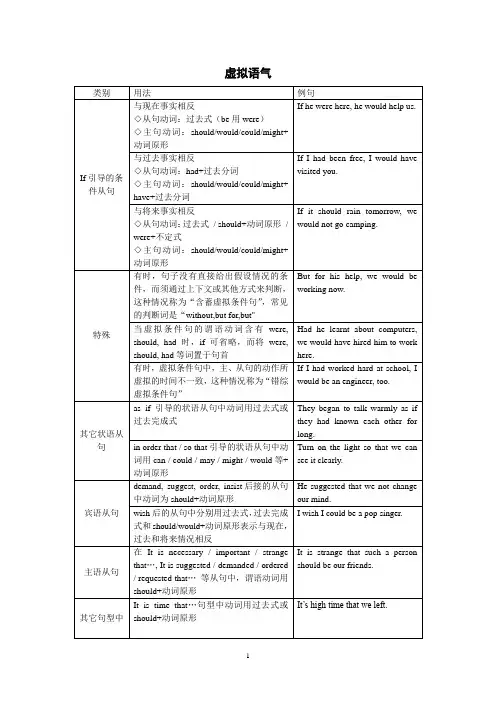
虚拟语气类别用法例句If引导的条件从句与现在事实相反◇从句动词:过去式(be用were)◇主句动词:should/would/could/might+动词原形If he were here, he would help us.与过去事实相反◇从句动词:had+过去分词◇主句动词:should/would/could/might+have+过去分词If I had been free, I would havevisited you.与将来事实相反◇从句动词:过去式/ should+动词原形/were+不定式◇主句动词:should/would/could/might+动词原形If it should rain tomorrow, wewould not go camping.特殊有时,句子没有直接给出假设情况的条件,而须通过上下文或其他方式来判断,这种情况称为“含蓄虚拟条件句”,常见的判断词是“without,but for,but"But for his help, we would beworking now.当虚拟条件句的谓语动词含有were,should, had时,if可省略,而将were,should, had等词置于句首Had he learnt about computers,we would have hired him to workhere.有时,虚拟条件句中,主、从句的动作所虚拟的时间不一致,这种情况称为“错综虚拟条件句”If I had worked hard at school, Iwould be an engineer, too.其它状语从句as if引导的状语从句中动词用过去式或过去完成式They began to talk warmly as ifthey had known each other forlong.in order that / so that引导的状语从句中动词用can / could / may / might / would等+动词原形Turn on the light so that we cansee it clearly.宾语从句demand, suggest, order, insist后接的从句中动词为should+动词原形He suggested that we not changeour mind.wish后的从句中分别用过去式,过去完成式和should/would+动词原形表示与现在,过去和将来情况相反I wish I could be a pop singer.主语从句在It is necessary / important / strangethat…, It is suggested / demanded / ordered/ requested that…等从句中,谓语动词用should+动词原形It is strange that such a personshould be our friends.其它句型中It is time that…句型中动词用过去式或should+动词原形It’s high time that we left.would rather所接的从句中动词用过去式或者过去完成式I would rather you stayed at home now.If only句型中动词常用过去式或者过去完成式,表示强烈的愿望If only our dream had come true!1. If there were no subjunctive mood, English ____ much easier.A. will beB. would have beenC. could have beenD. would be2. If she had worked harder, she ____.A. would succeedB. had succeededC. should succeedD. would have succeeded3. — If he ____, he ____ that food.— Luckily he was sent to the hospital immediately.A. was warned; would not takeB. had been warned; would not have takenC. would be warned; had not takenD. would have been warned; had not taken4. If he ____ me his telephone number yesterday, I ____ able to ring him up now.A. told; would beB. had told; would beC. had told; would have beenD. told; am5. If I ____ you, I ____ to Australia with Mr. Smith.A. had been; would goB. were; had goneC. were; would have goneD. am; will go6. Without electricity, human life ____ quite different today.A. isB. will beC. would have beenD. would be7. Our monitor was absent. Otherwise I ____ the chair.A. would not takeB. didn't takeC. hadn't takenD. wouldn't have taken8. — The experiment has failed!— I suggest that you ____ again.A. tryB. tryingC. will tryD. would try9. His silence at the meeting suggested that he ____ to your plan.A. didn't agreeB. hadn't agreedC. wouldn't agreeD. not agree10. The father insisted his daughter ____ a rich man.A. would be engaged toB. be engaged toC. should engage toD. must be engaged to11. She insisted that she ____ ill of him behind him, but he didn't believe.A. hadn't spokenB. shouldn't speakC. wouldn't speakD. not speak12. — I stayed at a hotel while in New York.— Oh, did you? You ____ with Barbara.A. could have stayedB. could stayC. would stayD. must have stayed13. I was really anxious about you. You ____ home without a word.A. mustn't leaveB. shouldn't have leftC. couldn't have leftD. needn't leave14. There was plenty of time. She ____.A. mustn't have hurriedB. needn't have hurriedC. must not hurryD. couldn't have hurried15. I wish I ____ you yesterday.A. seenB. did seeC. had seenD. were to see16. If my lawyer ____ here last Saturday, he ____ me from going.A. had been; would have preventedB. had been; would preventC. were; would preventD. were; would have prevented17. He ____ you more help, even though he was very busy.A. might have givenB. might giveC. may have givenD. may give18. If it ____ for the snow, we ____ the mountain yesterday.A. were not; could have climbedB. were not; could climbC. had not been; could have climbedD. had not been; could climb19. I told Sally how to get there, but perhaps I ____ for her.A. had to write it outB. must have written it outC. should have written it outD. ought to write it out20. I didn't see your sister at the meeting. If she ____, she would have met my brother.A. has comeB. did comeC. cameD. had come21. When a pencil is partly in a glass of water, it looks as if it ____.A. breaksB. has brokenC. were brokenD. had been broken22. You didn't let me drive. If we ____ in turn, you ____ so tired.A. drove; didn't getB. drove; wouldn't getC. were driving; wouldn't getD. had driven; wouldn't have got23. She couldn't have answered the question if she _____ a few books on world history.A. hadn't readB. hasn't readC. wouldn't readD. didn't read24. If it ____ so hard, we'd go to town.A. isn't rainingB. weren't rainingC. doesn't rainD. has rained25. Our former math teacher died of cancer last term, otherwise he ____.A. will still workB. should still workC. would still have workedD. would still be working26. The soldier died in the hospital. He ____ if the doctor ____ on him two hours earlier.A. might be saved; operatedB. could be saved; had operatedC. could have been saved; had operatedD. had been saved; was operated27. It's time that you ____ home and I'd rather you ____ again tomorrow.A. are going; will comeB. go; are comingC. went; cameD. would go; would come28. I ____ you a more valuable present for your birthday, but I was short of money at that time.A. would buyB. had boughtC. would have boughtD. must have bought29. I went to the meeting yesterday because I ____ nothing about the discussion without attending it.A. didn't knowB. would knowC. knewD. would have known30. It was required that each student ____ enough food for the public.A. bringB. broughtC. would bringD. had brought31. He didn't come yesterday, or you ____ him.A. would seeB. were to seeC. might have seenD. had seen32. It was suggested yesterday that a meeting ____ to discuss the matter.A. will be heldB. would be heldC. should holdD. be held33. It's strange that he ____ without saying good-bye to us.A. should have gone outB. wentC. should go outD. goes out34. Nothing could have saved him even if he ____ without delay.A. would be tendedB. was tendedC. has been tendedD. had ben tended35. The manager was angry and ordered that this work ____ tomorrow.A. be finishedB. finishC. was finishedD. would finish36. He is talking so much about Britain as if he ____ there.A. had beenB. has beenC. wasD. had gone37. The young man insisted that he ____ nothing wrong and ____ free.A. did; setB. had done; should be setC. do; be setD. had done; must be set38. My suggestion was that the meeting ____ off till next week.A. to putB. be putC. should putD. would be put39. Had you listened to the doctor, you ____ all right now.A. areB. wereC. would beD. would have been40. It is requested that Li Ming ____ at the class meeting on behalf of us.A. will speakB. speaksC. would speakD. speak41. — I didn't catch the first train this morning.— You ____ the first train if you ____ earlier.A. would catch; had got upB. could catch; should get upC. would have caught; had got upD. would catch; got up42. You ____ earlier. The bus left a moment ago.A. would comeB. should have comeC. must comeD. could have come43. Without your help, we ____ this task.A. don't finishB. will not finishC. didn't finishD. would not have finished44. Mr. Fang spoke slowly in order that we ____ him.A. should followB. followC. might followD. followed45. — Have you ever been to Hong Kong?— No, but I wish I ____.A. haveB. willC. doD. had46. What should we do if it ____ tomorrow?A. should snowB. would snowC. snowD. will snow47. He ____ the test, but he wasn't careful enough.A. could have passedB. were able to passC. must have passedD. might be able to pass48. If there ____ not the Communist Party, we ____ a happy life.A. were; couldn't liveB. are; can't liveC. is; can't liveD. was; wouldn't live49. But for the leadership of out Party and Government, we ____ these splendid results.A. have achievedB. couldn't have achievedC. could have achievedD. would achieve50. — It was the drug, not the disease, that killed the boy.— He would be still alive today if he ____ that drug.A. not takeB. shouldn't have takenC. didn't takeD. hadn't taken。
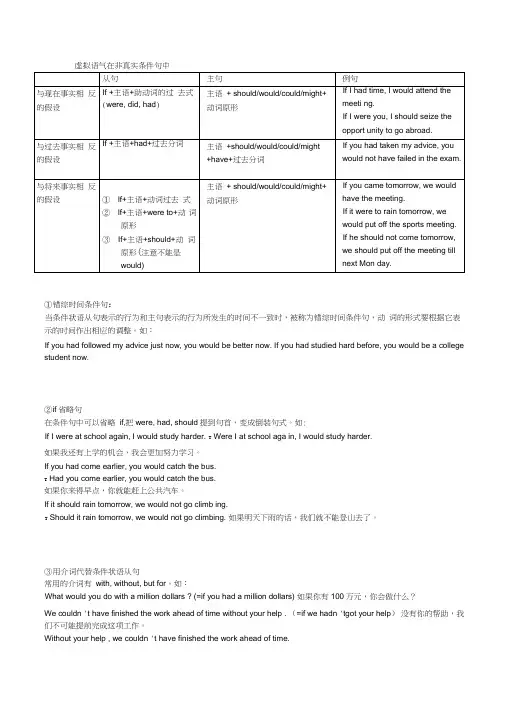
①错综时间条件句:当条件状语从句表示的行为和主句表示的行为所发生的时间不一致时,被称为错综时间条件句,动词的形式要根据它表示的时间作出相应的调整。
如:If you had followed my advice just now, you would be better now. If you had studied hard before, you would be a college student now.②i f省略句在条件句中可以省略if,把were, had, should提到句首,变成倒装句式。
如:If I were at school again, I would study harder. T Were I at school aga in, I would study harder.如果我还有上学的机会,我会更加努力学习。
If you had come earlier, you would catch the bus.T Had you come earlier, you would catch the bus.如果你来得早点,你就能赶上公共汽车。
If it should rain tomorrow, we would not go climb ing.T Should it rain tomorrow, we would not go climbing. 如果明天下雨的话,我们就不能登山去了。
③用介词代替条件状语从句常用的介词有with, without, but for。
如:What would you do with a million dollars ? (=if you had a million dollars) 如果你有100万元,你会做什么?We couldn 't have finished the work ahead of time without your help . (=if we hadn 'tgot your help)没有你的帮助,我们不可能提前完成这项工作。
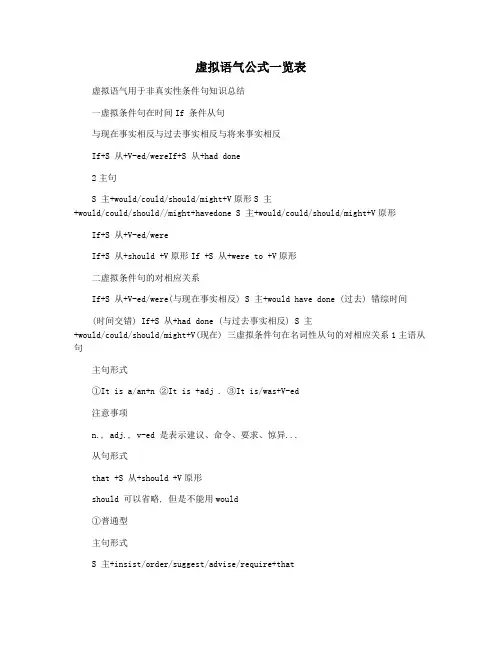
虚拟语气公式一览表虚拟语气用于非真实性条件句知识总结一虚拟条件句在时间If 条件从句与现在事实相反与过去事实相反与将来事实相反If+S 从+V-ed/wereIf+S 从+had done2主句S 主+would/could/should/might+V原形S 主+would/could/should//might+havedone S 主+would/could/should/might+V原形If+S 从+V-ed/wereIf+S 从+should +V原形If +S 从+were to +V原形二虚拟条件句的对相应关系If+S 从+V-ed/were(与现在事实相反) S 主+would have done (过去) 错综时间(时间交错) If+S 从+had done (与过去事实相反) S 主+would/could/should/might+V(现在) 三虚拟条件句在名词性从句的对相应关系1主语从句主句形式①It is a/an+n ②It is +adj .③It is/was+V-ed注意事项n., adj., v-ed 是表示建议、命令、要求、惊异...从句形式that +S 从+should +V原形should 可以省略, 但是不能用would①普通型主句形式S 主+insist/order/suggest/advise/require+that注意事项从从句形式原形should 可以省略, 但不能用would②wish 型时间现在过去将来S 主+wish+that主句形式S 从+were/V-ed主句谓语动词S 从+had+done 或者S 从+could +have doneS 从+could/might/would+V(主句主语和从句主语不同)3. 同位语从句主句形式S 主+V+N .从句形式that +S +should +V原形(同位名词是表示建议、命令、要求、惊异等意思的名词) 4. 表语从句公式:The N. +be+that +S从+should+V(原形)主语N. 是表示建议、命令、要求、惊异等意思的名词四虚拟条件句在的对相应关系类型让步连接词even ifeven though as ifas though lest in case for fear that时间现在、将来过去现在过去将来目的将来S 主+V主+O主S 主+V主+O主主句形式S 主+should+doS 主+should+havedone从句形式S 从+were/V-edS 从+haddone S 从+were/V-edS 从+haddone S 从+should+doS 从+should+do方式五.虚拟语气其他类型It is time…型类型It is time thatIt is high time that It is about time thatS 从+were/V-edS 从+should(不可省略)+V 原形从句形式2. if only 型(多为感叹句)时间现在没有实现的愿望过去没有实现的愿望将来没有可能实现的愿望S+were/V-edS+haddone S+would+V原形形式3. 倒装句正常语序If+S从+were…If+S从+haddone …If+S从+should +V 原形Were +S 从…Had +S从+done…Should +S 从+V 原形倒装语序4. would rather 型时间现在/未来过去主句形式从句形式S 从+V-ed/were…S 从+had done…S 主+would rather/wouldsooner/5. 含蓄条件句(介词短语)类型时间现在/未来介词+短语过去形式S +should/would/could/might+V 原形S +would/should/+have+done 常见介词but, or, but for, without, otherwise…。
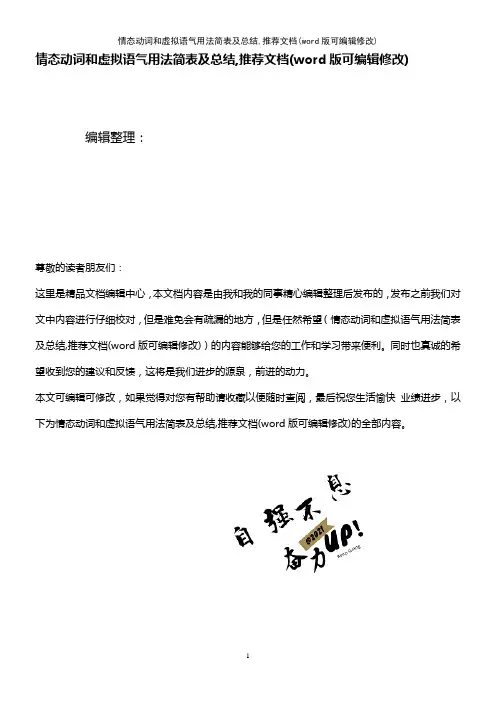
情态动词和虚拟语气用法简表及总结,推荐文档(word版可编辑修改) 编辑整理:尊敬的读者朋友们:这里是精品文档编辑中心,本文档内容是由我和我的同事精心编辑整理后发布的,发布之前我们对文中内容进行仔细校对,但是难免会有疏漏的地方,但是任然希望(情态动词和虚拟语气用法简表及总结,推荐文档(word版可编辑修改))的内容能够给您的工作和学习带来便利。
同时也真诚的希望收到您的建议和反馈,这将是我们进步的源泉,前进的动力。
本文可编辑可修改,如果觉得对您有帮助请收藏以便随时查阅,最后祝您生活愉快业绩进步,以下为情态动词和虚拟语气用法简表及总结,推荐文档(word版可编辑修改)的全部内容。
情态动词和虚拟语气用法简表及总结补充:1。
根据情态动词表推测的确信程度大小可作如下排序:must>will〉would〉ought to〉should〉can>could〉may>might2.shall的用法:(1)shall用于一、三人称疑问句中,表示征求对方的同意或向对方请示。
(2)shall用于二、三人称的陈述句中,表示说话人的允诺、保证、命令、威胁、警告、决心或者法律规章上的指示和规定等。
eg: ①Shall I open the window?②You shall get a new bike you want very much if you get the first prize in the coming exam。
注:shall,will表示命令时的区别。
⑴shall指法律、规章、制度上的“必须”.常用于正式文件中.⑵will指责任、义务上的“必须"。
常用于日常交际中.eg:①Each competitor shall wear a number。
②No one will leave the examination room before ten o’clock。
3.should的用法:⑴表意外,指说话人对某事不能理解,感到意外或惊异,意为“竟然,竟会”。
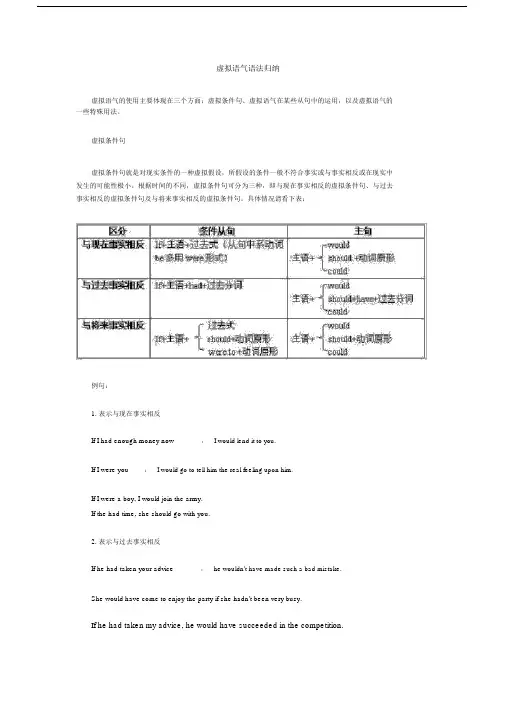
虚拟语气语法归纳虚拟语气的使用主要体现在三个方面:虚拟条件句、虚拟语气在某些从句中的运用,以及虚拟语气的一些特殊用法。
虚拟条件句虚拟条件句就是对现实条件的一种虚拟假设,所假设的条件一般不符合事实或与事实相反或在现实中发生的可能性极小。
根据时间的不同,虚拟条件句可分为三种,即与现在事实相反的虚拟条件句、与过去事实相反的虚拟条件句及与将来事实相反的虚拟条件句。
具体情况请看下表:例句:1.表示与现在事实相反If I had enough money now,I would lend it to you.If I were you,I would go to tell him the real feeling upon him.If I were a boy, I would join the army.If the had time, she should go with you.2.表示与过去事实相反If he had taken your advice,he wouldn't have made such a bad mistake.She would have come to enjoy the party if she hadn't been very busy.If he had taken my advice, he would have succeeded in the competition.3.表示与将来事实相反I would go shopping with you if it were to be Sunday tomorrow.If he were to be given another chance to do it again,he could certainly achieve more.If it were to rain tomorrow, the football match would be put off.1.虚拟条件句的倒装在虚拟条件句中,为了强调所假设条件的虚拟性,或突出说话人的一种主观愿望,虚拟条件句可用倒装结构。
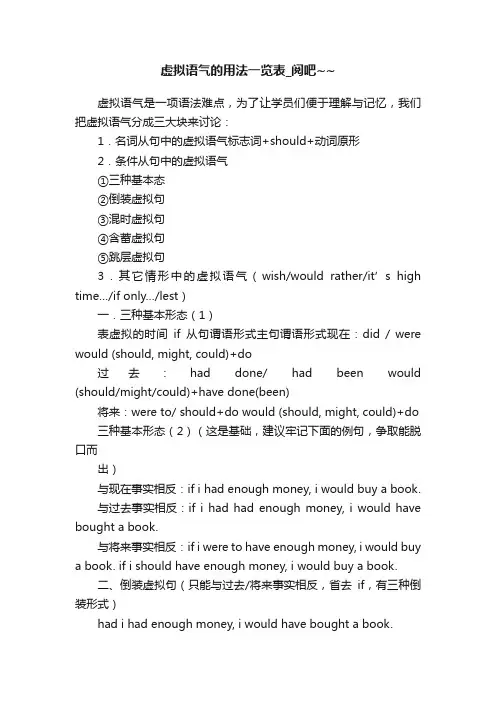
虚拟语气的用法一览表_阅吧~~虚拟语气是一项语法难点,为了让学员们便于理解与记忆,我们把虚拟语气分成三大块来讨论:1.名词从句中的虚拟语气标志词+should+动词原形2.条件从句中的虚拟语气①三种基本态②倒装虚拟句③混时虚拟句④含蓄虚拟句⑤跳层虚拟句3.其它情形中的虚拟语气(wish/would rather/it’s high time…/if only…/lest)一.三种基本形态(1)表虚拟的时间if从句谓语形式主句谓语形式现在:did / were would (should, might, could)+do过去:had done/ had been would (should/might/could)+have done(been)将来:were to/ should+do would (should, might, could)+do 三种基本形态(2)(这是基础,建议牢记下面的例句,争取能脱口而出)与现在事实相反:if i had enough money, i would buy a book.与过去事实相反:if i had had enough money, i would have bought a book.与将来事实相反:if i were to have enough money, i would buya book. if i should have enough money, i would buy a book.二、倒装虚拟句(只能与过去/将来事实相反,省去if,有三种倒装形式)had i had enough money, i would have bought a book.were i to have enough money, i would buy a book.should i have enough money, i would buy a book.三、混合时间虚拟语气(主要是抓住时间状语)(对过去事实虚拟+对现在事实虚拟)if i had studied english at school, i could read the english novel now. (对现在事实虚拟+对过去事实虚拟)if she were not so careless, she wouldn’t have made such a mistake.四、含蓄虚拟句what would i have done without you?but for their help, i would not have finished the task.but that the doctor arrived on time that day, they would have been dead. given more time, i would have been able to finish the test.五、跳层虚拟句(即句子一半为虚拟,另一半为陈述语气;but前句用虚拟而or/otherwise后句用虚拟)(but) he would put on weight, but he doesn’’’’’’’’t eat much. (与现在事实相反)he would have put on weight, but he didn’’’’’’’’t eat much. (与过去事实相反)(or, or else, otherwise) i forget where i read the article, or i would show it to you now. 现在事实相反)mary couldn’’’’’’’’t have received my letter, otherwise she would have replied before now. (与过去事实相反)六、名词从句虚拟语气(1) ask, advise, beg, command, demand, decide, desire, insist, order, prefer, propose, require, recommend, request, suggest, urge等表示命令、要求、建议等含义的动词后的宾语从句中,谓语动词用(should)+动词原形,eg. i suggest / suggested that we (should) go tomorrow.名词从句虚拟语气(2) it is +(形容词/过去分词/特定名词)+that的从句中,形容词主要是表示令人吃惊的、重要的、必要的、关键的等词汇。
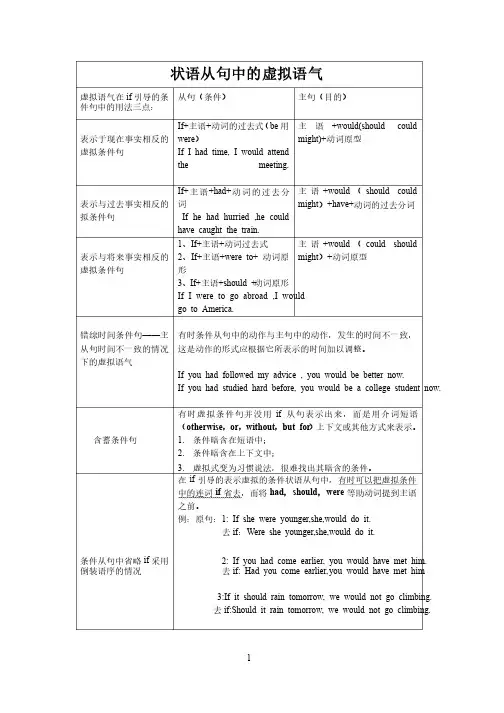
状语从句中的虚拟语气虚拟语气在if 引导的条件句中的用法三点:件句中的用法三点:从句(条件)从句(条件) 主句(目的)主句(目的)表示于现在事实相反的虚拟条件句虚拟条件句 If+主语+动词的过去式(be 用were ) If If I I I had had had time, time, time, I I I would would would attend attend the meeting. 主语+would(should could might)+动词原型动词原型表示与过去事实相反的拟条件句拟条件句If+主语+had+动词的过去分词 If If he he he had had had hurried hurried hurried ,he ,he ,he could could have caught the train. 主语+would (should could might )+have+动词的过去分词动词的过去分词表示与将来事实相反的虚拟条件句虚拟条件句 1、If+主语+动词过去式动词过去式 2、If+主语+were +were to+ to+ 动词原形3、If+主语+should +动词原形动词原形If I were to go abroad ,I would go to America. 主语+would (could should might )+动词原型动词原型 错综时间条件句——主从句时间不一致的情况下的虚拟语气下的虚拟语气有时条件从句中的动作与主句中的动作,发生的时间不一致,这是动作的形式应根据它所表示的时间加以调整。
这是动作的形式应根据它所表示的时间加以调整。
If you had followed my advice , you would be better now. If you had studied hard before, you would be a college student now. 含蓄条件句含蓄条件句 有时虚拟条件句并没用if 从句表示出来,而是用介词短语(otherwise ,or ,without ,but for )上下文或其他方式来表示。
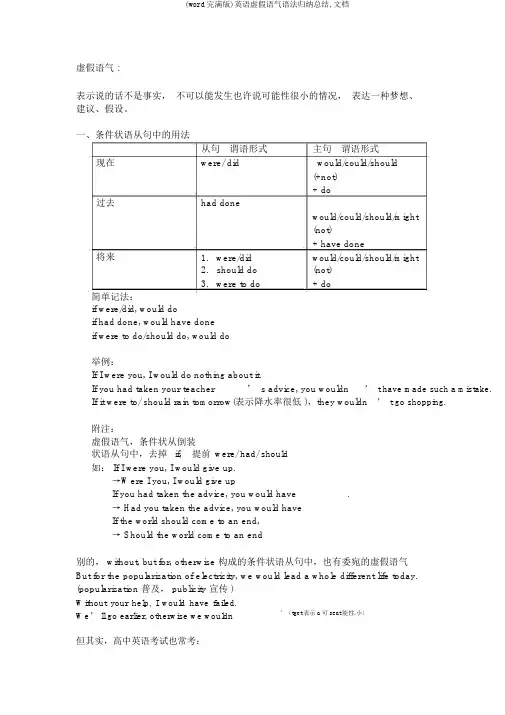
(word完满版)英语虚假语气语法归纳总结,文档虚假语气 :表示说的话不是事实,不可以能发生也许说可能性很小的情况,表达一种梦想、建议、假设。
一、条件状语从句中的用法从句谓语形式主句谓语形式现在were/ did would/could/should(+not)+ do过去had donewould/could/should/might(not)+ have done将来 1.were/did would/could/should/might2.should do(not)3.were to do+ do简单记法:if were/did, would doif had done, would have doneif were to do/should do, would do举例:If I were you, I would do nothing about it.If you had taken your teacher’ s advice, you wouldn’ t have made such a mistake.If it were to/ should rain tomorrow(表示降水率很低 ),they wouldn’ t go shopping.附注:虚假语气,条件状从倒装状语从句中,去掉if,提前were/ had/ should如: If I were you, I would give up.→Were I you, I would give upIf you had taken the advice, you would have .→ Had you taken the advice, you would haveIf the world should come to an end,→ Should the world come to an end别的, without, but for, otherwise 构成的条件状语从句中,也有委宛的虚假语气But for the popularization of electricity, we would lead a whole different life today. (popularization 普及, publicity 宣传 )Without your help, I would have failed.We’ ll go earlier, otherwise we wouldn’〔tget表示a可seat能性.小〕但其实,高中英语考试也常考:错综虚假语气条件句即:假设条件状从发生的时间与所假设的谓语动词不一致,此时,主句和从句要依照各自的时间而定。
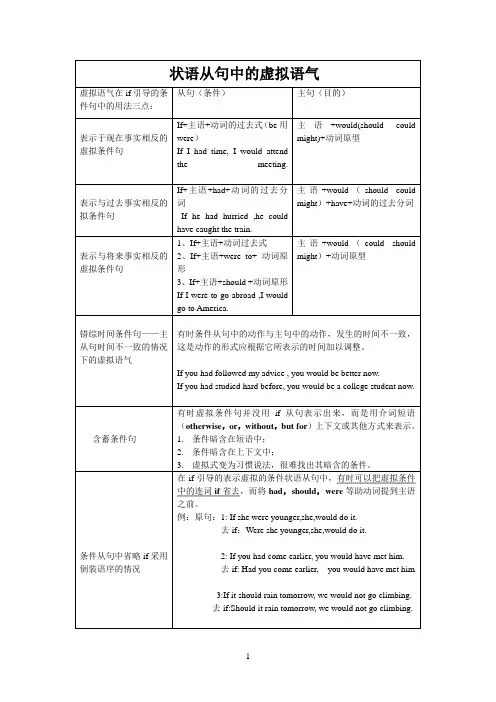
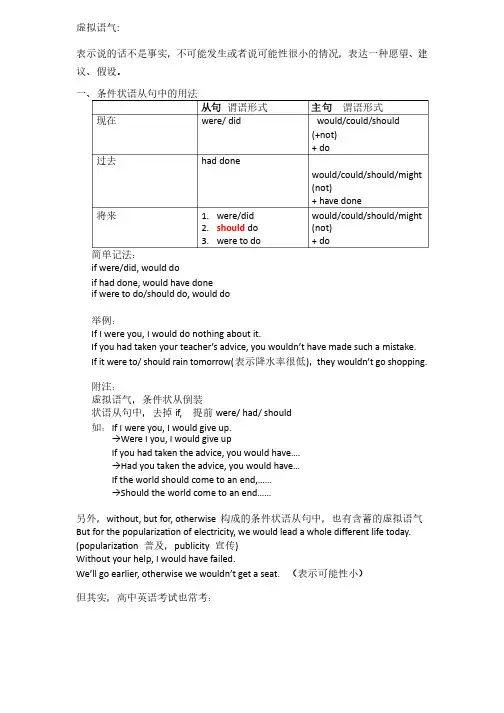
虚拟语气:表示说的话不是事实,表示说的话不是事实,不可能发生或者说可能性很小的情况,不可能发生或者说可能性很小的情况,不可能发生或者说可能性很小的情况,表达一种愿望、表达一种愿望、表达一种愿望、建建议、假设。
议、假设。
一、条件状语从句中的用法一、条件状语从句中的用法从句 谓语形式谓语形式主句 谓语形式谓语形式现在现在were/ didwould/could/should (+not) + do 过去过去 had donewould/could/should/might (not)+ have done将来将来1. were/did2. should do3. were to dowould/could/should/might (not) + do简单记法:简单记法:if were/did, would doif had done, would have done if were to do/should do, would do举例:举例:If I were you, I would do nothing about it.If you had taken your teacher’s advice, you wouldn’t have made such a mistake. If it were to/ should rain tomorrow(表示降水率很低),they wouldn’t go shopping.附注:附注:虚拟语气,条件状从倒装虚拟语气,条件状从倒装状语从句中,去掉if, 提前were/ had/ should 如:If I were you, I would give up. →Were I you, I would give upIf you had taken the advice, you would have…. →Had you taken the advice, you would have… If the world should come to an end,…… →Should the world come to an end……另外,without, but for, otherwise 构成的条件状语从句中,也有含蓄的虚拟语气构成的条件状语从句中,也有含蓄的虚拟语气 But for the populariza on of electricity, we would lead a whole different life today. (populariza on 普及,publicity 宣传) Without your help, I would have failed.We’ll go earlier, otherwise we wouldn’t get a seat. (表示可能性小)(表示可能性小)但其实,高中英语考试也常考:但其实,高中英语考试也常考:错综虚拟语气条件句错综虚拟语气条件句 即:即:假设条件状从发生的时间与所假设的谓语动词不一致,此时,主句和从句要根据各自的时间而定。
英语虚拟语气归纳整理【四大类别】1. If虚拟条件句2. Wish/if only/would rather 愿望和as if(though>好像3. 从句中should+动词原形,should可省略4. It ' s time 从句第一类If虚拟条件句分三种时态:与现在事实相反、与过去事实相反、与将来事实相反。
*条件句有真实条件句和非真实(虚拟〉条件句两种。
真实条件句的假设是有可能发生的,而非真实条件句的假想与事实相反或不大可能会发生,试比较:b5E2RGbCAPIf I have time, I will go with them. 假若我有时间,我就同他们去。
(陈述语气> p1EanqFDPwIf I were you, I would go with them. 假若我是你,我就同他们去。
(虚拟语气> DXDiTa9E3d注:几点特别说明1、I would/should/could/might 主句谓语中的should主要用于第一人称后;would表示结果还表示过去经常常常做某事,might表示可能性,could表示能力、允许或可能性。
比较:RTCrpUDGiTIf you tried aga in ,you would succeed. 要是你再试一试,你就会成功的。
(would表结果> 5PCzVD7HxAIf you tried again ,you might succeed. 要是你再试一试,你可能会成功的。
(might表可能> jLBHrnAlLgIf you tried aga in ,you could succeed. 要是你再试一试,你就能成功了。
(could 表能力> XHAQX74J0X 2、错综时间虚拟条件句:即条件从句与主句所指时间不一致,如从句指过去,而主句即指的是现在或将来,此时应根据具体的语境情况,结合上面提到的三种基本类型对时态作相应的调整:LDA YtRyKfEIf it had rained last ni ght, the ground would be wet now. 要是昨晚下过雨的话,现在地面就会是湿的。
虚拟语气一、虚拟语气用于非真实条件句(一)形式I.动词的语气简介:语气——表示说话人对说话内容的看法的一种语法范畴。
在英语中,可用不同的动词形式表示说话的语气。
•虚拟语气——与事实相反,表达的是怀疑、忧虑推测、祝愿等。
II.虚拟语气的运用一、在if条件从句中的运用(一)表格及注意事项•注:• 1. 目前,虚拟语气的were除了在If I were you 的结构中不能改动外,其他有些情况可以用was。
• 2. 如果表示否定的意思,多用过去时结构,用should和were to较少。
(二)、虚拟条件句中的省略和倒装若符合下列条件,可以省略if:• 1.必须是非真实条件句,并且有时,才可以省略if.• 2.省略if时,主语与的位置必须相互调换。
例:(1)万一我见到她,我会告诉她的。
If I should meet her, I would tell her.(2)如果我处在你的位置上,我会做得更好。
If I were in your position, I would do it better.(3)如果他们准备了的话,他们应该能成功的。
If they had made preparations, they would have succeeded.(三)含蓄条件句假设情况不以if条件句表现出来,而是通过某个介词或介词短语,不定式表现出来。
如with,without,but,but for, otherwise等。
根据句子要表达的事态,选择相应的虚拟语气的形式。
I lost her phone number, otherwise I her up.我弄丢了她的电话号码,否则我就能打给她了If I had not lost her phone number…But for your help, I would not have the chance to go to school.要不是有你的帮助,我不会有机会去学校的。
虚拟语气拟语气这类名词有:advice,decision,desire,demand,idea,order,pity,proposal,recommendation,suggestion,surprise,wish,wonder等。
二.表语从句或同位语从句中的虚拟语气某些表示建议,请求,命令等主观意向的名词做主语时,其后的表语从句或同位语从句需用虚拟语气表达形式为should+动词原型或直接用动词原型。
My idea is that we (should ) think it over before accepting it.We all agree to that suggestion that the meeting (should) be put off.在It is demanded/suggested/ordered/required….that-clause句型中从句用(should )+动词原型It is demanded that we should work out a plan.这类名词常见的有:demand,desire,requirement,advice,recommendation,suggestion,order,necessity,proposal,plan,idea。
在It is (about/high) time+that 定语从句中的虚拟语气表示“该做……..的时候了”其动词形式用一般过去时或should+动词原型It is high time that you went / should go to school.注意:在this is the first time/ second time that….句型中,从句中谓语动词用陈述语气完成时态。
This is the second time that we have achieved such a great success.。
虚假语气( Subjunctive Mood)1.if (条件状从句)与在事相反与去事相反与未来事相反条件句条件从句中省略 if 采纳倒装序的状况委宛条件从句(省略 if ,用其余取代)从句( if)主句形式例句would/could/If I were you,I should did/were should/might study English.+dowould/could/If you had taken my had done should/might advice,you wouldn’t+have done have failed in the exam.①did would/could/If it were to rain②should do should/might tomorrow, the meeting③were to do+do would be put off.主、从句时间不一致,动词形式要依据它所表示的时间来调整。
eg. : If I had worked hard at school,I would be an engineer,too.“ were,had,should +主语”放句首(否定词not 不可以放前方)。
eg.: ①Were I in school again,I would work harder.②H ad you been here earlier,you would have seen him.③S hould there be a meeting tomorrow,I would come.注意: Were it not for the expense,I would go to Italy.(√)Weren’ t it for the expense,I would go to Italy.(×)常用词:①介词:with,without,but for(要不是,假如没有);②连词: or,but;③副词:otherwise.eg.: ①Without air, there would be no living things.②But for your help,I couldn ’ t have finished it in advance.③I was ill that day.Otherwise,I would had taken part in the sports meeting.=If I hadn’ t been ill that day,I would had...2. wish (从句) /if only( 假如⋯⋯就好了)从句形式与在事相反did/were 与去事相反had done例句①I wish it were spring all the year round.②If only I were a bird!①Jack drove fast and was in an accident. Hesaid, “ I wish I had driven more carefully!” .②If only I had taken his advice.would/could/I wish you could go with us tomorrow.与未来事相反might do3.would rather +从句(表示宁愿某人在此刻或未来要做某事或过去做过某事)从句形式例句与在或未来事相反did/were I would rather you came tomorrow.与去事相反had done I ’ d rather you hadn ’ t been present.4. as if/as though,even if/though+ 从句从句谓语形式例句与此刻事实相反did/were He looked as if he were an artist.与过去事实相反had done He talked about the Great Wall as if he had been there before.与未来事实相反would/could/He opened his mouth as if he would say might do something.注意: 1. 在 as if/as though句中,假如有可能成为事实,用陈说语气。
补充:1.根据情态动词表推测的确信程度大小可作如下排序:must>will>would>ought to>should>can>could>may>might2.shall的用法:(1)shall用于一、三人称疑问句中,表示征求对方的同意或向对方请示。
(2)shall用于二、三人称的陈述句中,表示说话人的允诺、保证、命令、威胁、警告、决心或者法律规章上的指示和规定等。
eg: ①Shall I open the window?②You shall get a new bike you want very much if you get the first prize in the coming exam.注:shall,will表示命令时的区别。
⑴shall指法律、规章、制度上的“必须”。
常用于正式文件中。
⑵will指责任、义务上的“必须”。
常用于日常交际中。
eg:①Each competitor shall wear a number.②No one will leave the examination room before ten o'clock.3.should的用法:⑴表意外,指说话人对某事不能理解,感到意外或惊异,意为“竟然,竟会”。
⑵表推测,指确定的或可能有的未来或希望,意为“应该”。
⑶表可能,常用在if条件句中,强调某事的可能性,意为“要是,万一”。
eg:①I am surprised that you should speak like that.②They should be ready by 12:00.③If he should come,please let me know.4.would与used to的区别(1)二者都可表示过去重复的习惯动作。
(2)表示过去的状态,只能用used to,不能用would.(3)used to强调过去与现在的对比,而would只表示过去习惯的动作,常与often、every day等状语连用。
虚拟语气虚拟语气:表示动作或状态不是客观存在的事实,而是说话人的主观愿望、假设或推测等。
一、if从句:(二)错综时间的虚拟句:通常情况下,在条件句中主句和从句的谓语动词所指时间一致, 但有时也可能指不同的时间,这时主句和从句的动作不是发生在同一时间,其动词形式要根据时间而定。
1. If I were you, I would have taken his advice. (从句指现在, 主句指过去)。
2. If I had taken my raincoat with me this morning, I would not be wet now. (从句指过去,主句指现在)。
3. If we hadn’t been working hard in the past few years, things wouldn’t be going so smoothly.(从句指过去,主句指现在)。
4. If the weather had been more favorable, the crops would be growing still better.(从句指过去,主句指现在)。
5. If we had not got everything ready by now, we should be having a more terrible time tomorrow. (从句指现在,主句指将来)(三)省略:If 从句中含有were, should, had时,可省略if并把were, should, had提前。
例如:Were I you, I wouldn’t quarrel with him.备注:注:would, should, could与might的选择:①一般常用would,如同在真实条件句中主句常要用will一样。
常译作“将、就会”。
如:If I knew him, I would ask him for help. 如果我认识他的话,我就会向他求助。